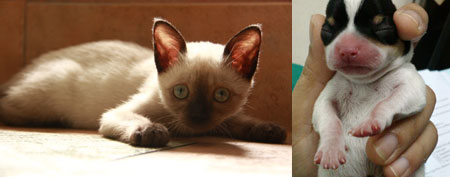
1. The main vaccine (core vaccine) that must be given to all dogs and cats. The primary vaccine protects against severe infectious diseases that are spreading around the world.
The main vaccines for dogs include:
- Canine distempervirus (CDV) vaccine
- Canine adenovirus (CAV) or hepatitis vaccine
- vaccine against parvovirus (canine parvovirus-2; CPV-2) or inflammatory bowel disease
- Rabies virus vaccine
The main vaccines for cats include:
- Feline parvo virus (FPV) vaccine
- Feline callicivirus (FCV) and feline herpesvirus-1 (FHV-1) or cat flu vaccines
- Rabies virus vaccine
2. Alternative vaccine (non core vaccine) should be considered according to the risk of exposure to the disease at the discretion of the veterinarian. considering the environment animal immunity and the spread of disease in the area or high-risk dogs that live or have to travel into Areas with high tick carry or in endemic areas
Alternative vaccines in dogs such as
- Vaccines against canine parainfluenza virus (CPiV) or canine flu.
- vaccine against Leptospira interrogans or leptospirosis; leptospirosis
Alternative vaccines for cats such as
- The leukemia vaccine (Feline leukemia virus) is for use only in uninfected cats; FeLV and must be tested for FeLV before injection.
- Vaccines against chlamydia (Chlamydophila felis)
Vaccines for puppies and cats
Young animals are immune from the mother during the first weeks after birth or Maternal Derived Antibodies (MDA), which can be obtained before birth and receiving the mother’s blood. This immunity gradually decreases as young animals are 8-12 weeks old, and MDA can interfere with vaccine-derived immunization. Young animals with low MDA (not colostrum, mother not properly vaccinated) may be at risk of infection and may respond to vaccination. However, if the young animal gets more MDA, the vaccination will fail.
Therefore, the organization of the vaccine program should be in the opinion of the veterinarian. and follow the instructions Having properly and fully vaccinated animals reduces the chances of infection. or can reduce the severity of the disease in case of illness In conclusion, puppies and cats should be vaccinated for the first time at 2 months of age. After 3-4 weeks of vaccination, immunity will gradually build up, so we need to re-vaccinate so that the immunity is high enough to prevent disease. And the last dose should be given when the cub has passed 4 months of age. During the period that the vaccination program is not complete, the cub should not be taken out of the area at risk of infection. and let the young animal meet only other healthy and vaccinated pets.

